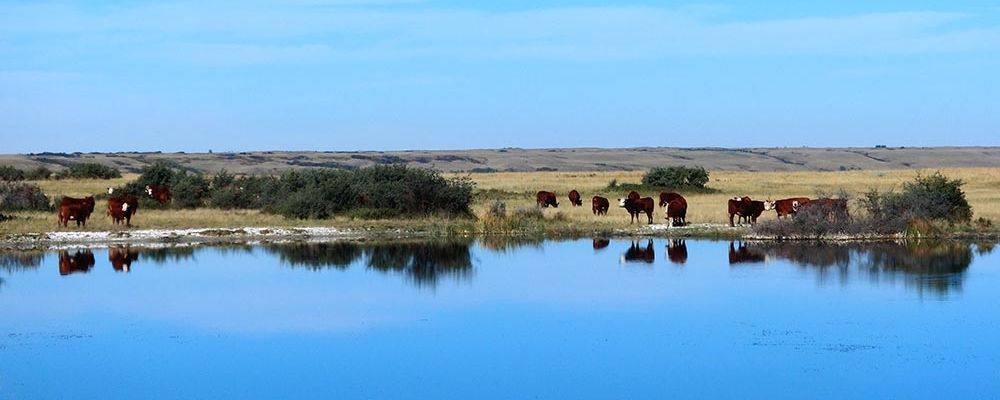The Rangeland Research Institute provides researchers with opportunity to conduct a wide range of short- and long-term research projects focused on providing a solid scientific foundation for the sustainable management of rangelands.

We support research that combines expertise and approaches from a variety of academic disciplines and addresses issues related to the competing demands of ecosystem conservation and resource use, including energy exploration and extraction, grazing, water management, wildlife management and biodiversity conservation, and sustainable landscape management.
Read the University of Alberta Beef and Range Report, published in August 2014.
Research project summaries. The table is searchable by keywords and topics (e.g. grazing) and summaries may be viewed and downloaded as pdf files:
Researchers Project title (link to pdf of brief project summary) keywords Year Locations
Dombro, Bork, Raatz Combating annual brome grass invasion in Mixedgrass Prairies Invasive species; downy brome 2024 public & private land, southern Alberta
Zapisocki, Wagner, Murillo Non-Native Plant Invasions in Prairie Grasslands of Alberta Invasive species 2023 Mattheis Ranch and various in Alberta
Behrouzi, Bork, Fitzsimmons, Basarab Methane Emissions from Commercial Beef Cows During Open-Range Grazing in the Parkland Precision ranching; greenhouse gases 2022 Kinsella Ranch
Bork, Fitzsimmons ‘Precision Ranching’ of Beef Cattle Precision ranching; background 2022 Kinsella Ranch
Mufford, Church, Carlyle Using drones to measure heat stress in cattle Precision ranching; cattle heat stress 2022 Kinsella Ranch
Harland, Fitzsimmons, Bork Virtual Fencing for Real-Time Flexible Control of Grazing Beef Cattle Precision ranching; virtual fencing 2022 Kinsella Ranch
Lopes, Fitzsimmons, Carlyle, Bork Habitat Selection by Commercial Beef Cows Grazing Heterogeneous Aspen Parkland Rangeland Precision ranching; cattle grazing & habitat selection 2022 Kinsella Ranch
Oloyede, Fitzsimmons, Li, Bork Characterizing Activity Budgets of Free-Range Beef Cows Precision ranching; cattle grazing activity 2022 Kinsella Ranch
Silva, Londono, Lasso Assessing the impacts of weather in western grazing beef females Precision ranching; cattle heat stress 2022 Kinsella Ranch
Udeh, Fitzsimmons, Guan, Cahill, Bork Using DNA Barcoding to Characterize Free-Range Beef Cattle Diets Precision ranching; cattle grazing diet selection 2022 Kinsella Ranch
Lewis, Haughland, Carlyle Finding new species of lichen Grassland lichens 2022 Mattheis Ranch, various locations
Ma, Chang, Bork Understanding the effect of defoliation intensity on carbon flow at two ecosites at the Mattheis Ranch Carbon flow; carbon sequestration, defoliation 2022 Mattheis Ranch
Bork, Grenke, Carlyle, Dobert, Cahill, Boyce Comparative Management Attributes Associated with Adaptive Multi-Paddock (AMP) Grazed Ranches and Neighbouring Cattle Operations Rotational grazing, Adaptive Multi-paddock grazing 2020 Mattheis Ranch, various private ranches across Alberta
Martin, Bork Effects of Industrial Linear Landscape Features on Grassland Songbirds Industrial development on grasslands; songbirds 2019 Mattheis Ranch
Liu, Guan Assessment of Rumen Microbiota in Beef Cattle with Different Feed Efficiency on Grazing Rangeland Beef cattle microbial community; RFI 2019 Mattheis Ranch
Dahl, Bork Assessing Range Health in Relation to Grazing Systems Used on Alberta Ranches Range health; grazing systems 2019 various across Alberta
Gamon, Wang Measuring the Carbon Storage of Rangelands Carbon sequestration 2018 Mattheis Ranch
Schroeder, Macdonald, Gould Can Wet Areas Mapping (WAM) be Used to Predict Invasive Species in Dry Mixed Grass Prairie? Invasive species; Wet Areas Mapping 2018 Mattheis Ranch
Chuan, Bork, Chang, Hewins, Carlyle Grazing Mediated Impacts on Litter Decomposition May Help Alberta Grasslands be Managed to Mitigate Climate Change Nutrient cycling; litter; carbon cycle 2018 Mattheis Ranch, various in Alberta
Stotz, Cahill Smooth Brome Invasion into Alberta’s Native Grasslands Invasive species; smooth brome 2017 Mattheis & Kinsella Ranches; and various in Alberta
Chang, Bork, Carlyle Silvopastures Promote Carbon Storage and Reduce Greenhouse Gas Emissions Carbon sequestration 2017 Mattheis Ranch, various in Alberta
Broadbent, Willms, Hewins, Bork Intermittent Defoliation Impacts on Mixedgrass Prairie Rotational grazing; defoliation; moisture 2017 Mattheis Ranch
Najafi, Bork, Carlyle, Quideau, James Contrasting Access Mats and Conventional Powerline Construction Impacts on Mixedgrass Vegetation Industrial development on grasslands; powerline construction 2016 Mattheis Ranch
Kohler, Carlyle Native Bees in Alberta’s Agricultural Landscape Grassland pollinators 2016 Mattheis Ranch
James, Bork, Carlyle, Najafi, Quideau Access Mats Reduce Mixedgrass Prairie Soil Physical Responses to Industrial Traffic Industrial development on grasslands; powerline construction; industrial traffic 2016 Mattheis Ranch
Hewins, Bork Carbon Benchmarking in Alberta Grasslands Carbon sequestration 2016 various across Alberta
Chuan, Hewins, Chang, Adams, Carlyle, Bork Livestock grazing increase litter decomposition among plant species across Alberta rangelands Nutrient cycling; carbon cycle; grass litter 2016 Mattheis Ranch, various in Alberta
